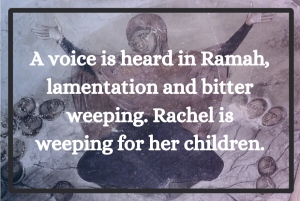Holding the Reality of Our Experience
It can be difficult to admit when we’re holding grief at Christmas. In the movie, “Merry Christmas, Charlie Brown”, Charlie Brown says: “I think there must be something wrong with me, Linus. Christmas is coming, but I’m not happy. I don’t feel the way I’m supposed to feel.”
For some of us, Christmas is the happiest time of the year. I’ve had times when I wanted it to be the happiest time of the year, and it wasn’t. This expectation of joy can bring an extra layer of disappointment in addition to the loss we already feel. This is one reason why holding grief during the holidays can feel heavier than it does in other seasons.
All of us have experienced suffering and loss, but there aren’t many rituals built around processing this at Christmas.
Thankfully, there is space for holding grief built right into the nativity story. Even though we like to highlight the joyful aspects of Christmas, part of what makes the good news good is that it is spoken into the context of our pain. Christmas is not just a story of joy, it’s also a story of weeping, silence, and longing for redemption.
Holding Grief with Rachel
After Jesus is born, Herod kills the baby boys of Bethlehem in an effort to stop the coming of the new King. In response, we hear a voice call out from the Old Testament into the new:
“Thus says the Lord: A voice is heard in Ramah, lamentation and bitter weeping. Rachel is weeping for her children; she refuses to be comforted for her children, because they are no more.” Matthew 2:18
Rachel is the one who is weeping, but the Lord is the one who is speaking. God holds space for Rachel’s tears.
When we lost our first baby in 2019, I was afraid of grieving. I thought that if I wept like Rachel, I would never be able to stop. I suppressed my grief. Have you ever felt the kind of sadness that threatens to swallow you up?
I thought that moving on would be like losing twice. I was afraid that the grief would fundamentally change me, and that I would feel it forever. When I told a counselor that I was afraid of being permanently changed by grief, they said, “what if change can lead to something good?”
I lost another baby this year, and I wanted to respond differently. There aren’t many ways that our culture honors this type of grief. There was no funeral, no family gathering. We’re expected to hold it privately. We’re even told to keep our pregnancies a secret, so that our baby’s death doesn’t make others feel sad or awkward.
I created more space for grief this time. I preached about it, and wrote a song about it. I shared that song and told my story at an open mic night. This is another way that the nativity story creates space for us: Mary writes a bold song in response to her experience.
Holding Grief with Mary
Let’s give some breathing room to this song that Mary sings. It’s not a simple song of joy. This is a song of what can come after change. This is what Mary thinks healing and justice will look like, based on her actual experiences of loss.
“My soul magnifies the Lord, and my spirit rejoices in God my Savior, for he has looked with favor on the lowliness of his servant.
Surely, from now on all generations will call me blessed; for the Mighty One has done great things for me, and holy is his name.
His mercy is for those who fear him from generation to generation.
He has shown strength with his arm; he has scattered the proud in the thoughts of their hearts.
He has brought down the powerful from their thrones, and lifted up the lowly; he has filled the hungry with good things, and sent the rich away empty.
He has helped his servant Israel, in remembrance of his mercy, according to the promise he made to our ancestors, to Abraham and to his descendants forever.” Luke 1:46-55
This is not the song of a proud, rich, or comfortable person. Mary can sing about poverty and hunger because she has seen and experienced it. What would our song would be if we were to describe what justice and healing looks like for us?

Lifting Up Every Voice
Mary and Rachel are two mothers who lived generations apart, but their voices hold a sacred space between them in the nativity story.
Rachel’s voice, weeping and refusing to be comforted, invites us to hold enough space for all of our tears. We don’t need to force joy as if it were better, wiser, or holier than grief. There is something holy about holding grief at Christmas.
Mary’s voice invites us to ground ourselves in God’s presence. She sends down deep roots that cling to the promises given to her ancestors, and have now been given to her. God is present, and God is reaching out for the healing of the world.
Holding Grief with Jesus
These two mothers are brave and vulnerable examples of how the nativity story doesn’t ignore or push past our experiences. Songs are sung, tears are wept, and Jesus comes to us at the very lowest part of our need.
“Come to me, all you that are weary and are carrying heavy burdens, and I will give you rest.” Matthew 11:28
Jesus holds space at Christmas, for us and for everything we bring with us. We don’t need to hide our weariness from him, just because joy is expected.
Jesus holds space for us to rest, to put down the expectations that we have for ourselves and instead treat ourselves with compassion. For more on Christmas expectations, check out my article, “Create Space for a Contemplative Christmas“.
If your voice were to call out like these mothers, would you sing a song or declare a longing for healing? Would it be a message of compassion to yourself, or to someone whom you have lost? There might simply be one word, holding sacred space to honor a name or a date. There may only be weeping.
May we take time to hold our experiences with compassion, as we are held with compassion by God.
May the voices of Mary and Rachel be for us models of lifting up every voice, as God is present to every cry and every tear.













